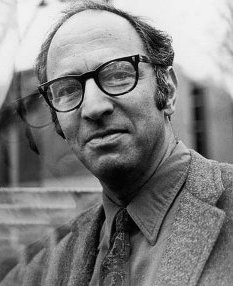Thomas Kuhn
Thomas Samuel Kuhn (July 18, 1922 – June 17, 1996) was an American philosopher of science whose work has influenced the philosophy of science significantly. He is best known for his book The Structure of Scientific Revolutions (1962), in which he introduced the concept of paradigm shifts in the scientific community.
Early Life and Education[edit | edit source]
Thomas Kuhn was born in Cincinnati, Ohio, in 1922. He obtained his Bachelor of Science degree in physics from Harvard University in 1943. After completing his undergraduate studies, Kuhn stayed at Harvard to earn a Ph.D. in physics. However, his interest gradually shifted from physics to the history and philosophy of science. This transition was influenced by his work on the Manhattan Project during World War II, where he began to question the linear progress of scientific knowledge.
Career[edit | edit source]
After receiving his Ph.D. in 1949, Kuhn took a position as a professor at the University of California, Berkeley, where he taught a course on the history of science. In 1964, he moved to Princeton University and later to the Massachusetts Institute of Technology (MIT) in 1979, where he continued his work until his retirement in 1991.
The Structure of Scientific Revolutions[edit | edit source]
In The Structure of Scientific Revolutions, Kuhn challenged the traditional view of science as a steady, cumulative acquisition of knowledge. Instead, he proposed that scientific progress occurs through a series of revolutionary changes, which he called "paradigm shifts." According to Kuhn, a paradigm is a widely recognized scientific achievement that provides model problems and solutions to a community of practitioners. When anomalies or problems that cannot be solved within the current paradigm accumulate, a scientific revolution occurs, leading to the adoption of a new paradigm.
Kuhn's concept of paradigm shifts has been influential beyond the philosophy of science, affecting fields such as sociology, business, and technology. His work has sparked extensive debate and has been a central reference point for discussions about scientific progress and the nature of scientific knowledge.
Legacy[edit | edit source]
Thomas Kuhn's contributions to the philosophy of science have had a lasting impact. His ideas about paradigm shifts and the non-linear progress of science have influenced various disciplines and sparked widespread academic debate. Kuhn's work has led to a more nuanced understanding of the scientific process, emphasizing the social and historical context in which scientific knowledge is developed.
Kuhn received numerous awards and honors for his work, including the George Sarton Medal from the History of Science Society and the John Desmond Bernal Prize. Despite the controversy some of his ideas have generated, Kuhn remains a seminal figure in the philosophy of science.
Selected Works[edit | edit source]
- The Structure of Scientific Revolutions (1962)
- The Essential Tension (1977)
- Black-Body Theory and the Quantum Discontinuity, 1894-1912 (1978)
See Also[edit | edit source]
Navigation: Wellness - Encyclopedia - Health topics - Disease Index - Drugs - World Directory - Gray's Anatomy - Keto diet - Recipes
Search WikiMD
Ad.Tired of being Overweight? Try W8MD's physician weight loss program.
Semaglutide (Ozempic / Wegovy and Tirzepatide (Mounjaro) available.
Advertise on WikiMD
WikiMD is not a substitute for professional medical advice. See full disclaimer.
Credits:Most images are courtesy of Wikimedia commons, and templates Wikipedia, licensed under CC BY SA or similar.
Contributors: Prab R. Tumpati, MD

